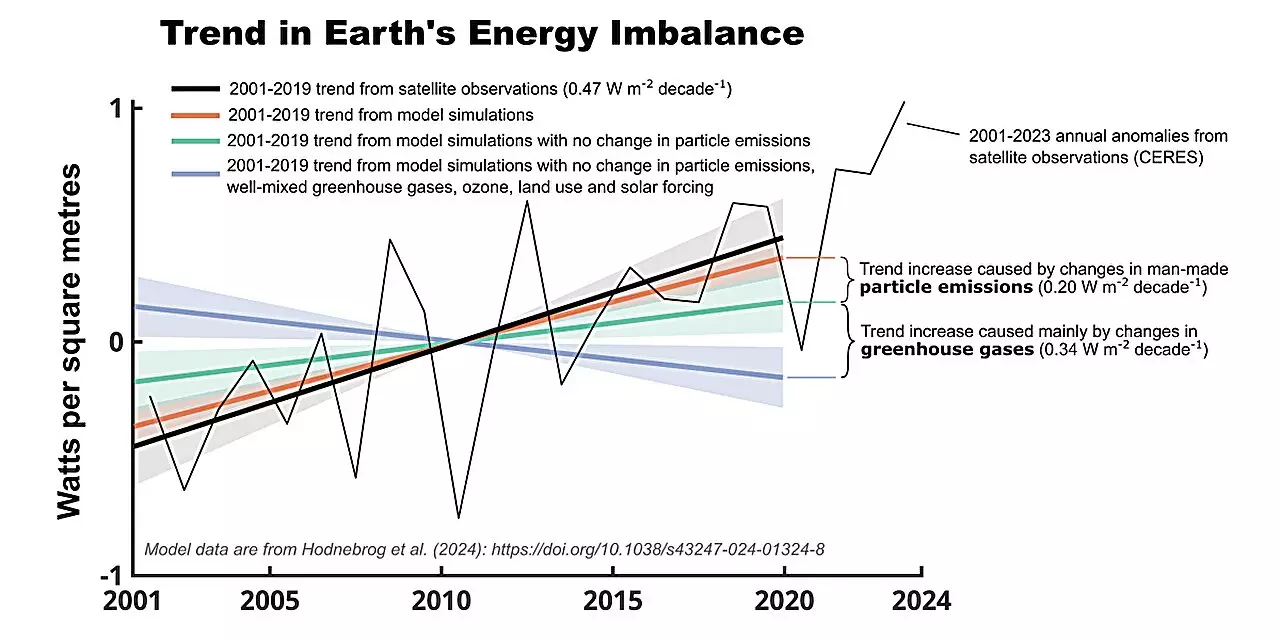The recent findings from an international study conducted by CICERO have unveiled a concerning trend regarding the Earth’s energy imbalance. According to the study published in Communications Earth & Environment, reductions in emissions of tiny particles that contribute to air pollution have inadvertently resulted in an increase in heat within the Earth’s climate system. This change in the Earth’s energy balance has significant implications for global warming and climate change.
Satellite measurements have unmistakably demonstrated that more solar radiation is penetrating the Earth’s atmosphere compared to the amount of energy being radiated back into space. This imbalance in Earth’s energy budget is primarily attributed to the recent decrease in man-made particle emissions contributing to air pollution. While these particles, particularly sulfate, have historically reflected sunlight and had a cooling effect on the planet, the reduction in their emissions has led to a reversal in this cooling effect, resulting in increased warming of the Earth’s surface.
The researchers utilized advanced global climate models to simulate the impact of reduced particle emissions on the Earth’s energy imbalance. By comparing these model simulations with satellite measurements spanning from 2001 to 2019, the study was able to establish a direct correlation between the decline in pollutant emissions and the escalating energy imbalance. The findings underscore the critical importance of accounting for changes in particle emissions to accurately predict and understand the Earth’s warming trends.
The study’s lead author, Øivind Hodnebrog from CICERO, emphasizes the significance of these findings in shedding light on the factors driving global warming, sea level rise, extreme weather events, and other consequences of climate change. The observed increase in Earth’s energy imbalance serves as a key indicator of the ongoing impact of human activities on the planet’s climate system. The study underscores the urgent need for continuous monitoring of the Earth’s energy budget through satellite observations.
While efforts to improve air quality and reduce air pollution are essential for public health, the study highlights the complex trade-offs involved in these initiatives. The removal of pollutant emissions that have a cooling effect on the planet can lead to a rapid increase in warming, whereas the long-lasting greenhouse gases like CO2 continue to linger in the atmosphere for centuries. This dilemma calls for a nuanced approach to addressing both air quality and climate change concerns simultaneously.
The study’s co-author, Gunnar Myhre, acknowledges that the additional warming resulting from the removal of cooling particles was anticipated by researchers. However, the empirical evidence presented in the study offers concrete proof of this phenomenon and underscores the need for comprehensive strategies to mitigate the adverse consequences of pollutant emissions on the Earth’s energy balance.
The recent study on the impact of reduced pollutant emissions on the Earth’s energy imbalance reveals a complex interplay between air quality improvements and climate change. By shedding light on the unintended consequences of emission reductions, the research underscores the need for holistic approaches to environmental management that consider both short-term air quality goals and long-term climate impact.Continuous monitoring and scientific analysis of the Earth’s energy budget are critical for understanding and addressing the evolving challenges posed by human activities on the planet’s climate system.


Leave a Reply